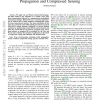Free Online Productivity Tools
i2Speak
i2Symbol
i2OCR
iTex2Img
iWeb2Print
iWeb2Shot
i2Type
iPdf2Split
iPdf2Merge
i2Bopomofo
i2Arabic
i2Style
i2Image
i2PDF
iLatex2Rtf
Sci2ools
CORR
2010
Springer
2010
Springer
Estimation with Random Linear Mixing, Belief Propagation and Compressed Sensing
Abstract--We apply Guo and Wang's relaxed belief propagation (BP) method to the estimation of a random vector from linear measurements followed by a componentwise probabilistic measurement channel. Relaxed BP uses a Gaussian approximation in standard BP to obtain significant computational savings for dense measurement matrices. The main contribution of this paper is to extend the relaxed BP method and analysis to general (non-AWGN) output channels. Specifically, we present detailed equations for implementing relaxed BP for general channels and show that relaxed BP has an identical asymptotic large sparse limit behavior as standard BP, as predicted by the Guo and Wang's state evolution (SE) equations. Applications are presented to compressed sensing and estimation with bounded noise.
CORR 2010 | Education | Relaxed Bp | Relaxed Bp Method | Standard Bp |
| Added | 09 Dec 2010 |
| Updated | 09 Dec 2010 |
| Type | Journal |
| Year | 2010 |
| Where | CORR |
| Authors | Sundeep Rangan |
Comments (0)

